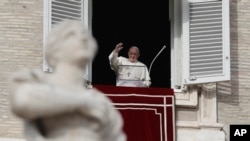Organizers of an upcoming Vatican summit on sex abuse prevention are warning that the credibility of the Catholic Church is in jeopardy over the abuse scandal and are urging participants to meet with victims personally before coming to Rome.
In a letter sent Tuesday to the presidents of bishops’ conferences worldwide, organizers said the church must develop a “comprehensive and communal response” to the crisis, and that the first step is “acknowledging the truth of what has happened.”
Pope Francis invited the church leaders to the Feb. 21-24 summit to respond to what has become the gravest threat to his papacy, as the abuse and cover-up scandal erupted in the U.S., Chile and elsewhere this year.
In revealing the first details of the meeting, the Vatican said the summit would focus on three main areas: responsibility, accountability and transparency. That suggests that church leaders will confront not only the crime of priests who rape and molest minors, but the cover-up by their superiors as well.
Abuse survivors and their advocates have long blasted the Vatican for failing to discipline and remove bishops who fail to protect their flocks, and until recently Francis appeared unwilling to significantly change course.
“Absent a comprehensive and communal response, not only will we fail to bring healing to victim survivors, but the very credibility of the Church to carry on the mission of Christ will be in jeopardy throughout the world,” the organizers wrote their brother bishops.
“Each of us needs to own this challenge, coming together in solidarity, humility, and penitence to repair the damage done, sharing a common commitment to transparency, and holding everyone in the church accountable,” they said.
It was signed by the four members of the preparatory committee for the meeting: Chicago Cardinal Blase Cupich, a Francis-appointee and supporter, Mumbai Cardinal Oswald Gracias, a member of the pope’s informal cabinet; as well as the Vatican’s leading abuse experts Maltese Archbishop Charles Scicluna and the Rev. Hans Zollner.
They urged conference presidents to meet with victims before they come to Rome “to learn firsthand the suffering they have endured.”
The appeal was an indication that throughout the church, many bishops continue to deny the scope of the problem and have never met with a victim. Some bishops’ conferences in Africa, for example, have yet to respond to a 2011 Vatican request to develop guidelines to deal with cases.
Vatican spokesman Greg Burke said that meeting with victims “is a concrete way of putting victims first and acknowledging the horror of what happened.”
Francis announced he was convening the summit in September, signaling awareness at the top of the church that clergy abuse is a global problem and not restricted to some parts of the world or a few Western countries.
He did so as he worked to recover from his botched handling of the scandal in Chile, sparked earlier this year when he repeatedly discredited victims of a notorious Chilean predator priest and defended a bishop who had protected him.
Francis eventually admitted he was wrong, apologized to the victims and secured offers of resignation for every active bishop in the country. Francis took action after The Associated Press challenged him on the case and demonstrated that he had received victims’ complaints.
Francis’ papacy was later jolted by accusations from a retired Vatican ambassador that the pope himself rehabilitated a now-disgraced American ex-cardinal accused of molesting and harassing adult seminarians. Francis hasn’t responded to the allegations, though he has ordered a limited investigation into them.
Expectations for the February summit, already high after a year of crisis, then took on greater import after the Vatican blocked U.S. bishops from taking action to impose new accountability measures on themselves at a meeting last month.
The Vatican never fully explained why it blocked the U.S. measures, part of the communications breakdowns that occasionally bedevil the Vatican.
The details of the February summit were announced on the same day the Vatican announced a shakeup in its communications operation.
Francis named veteran Vatican correspondent Andrea Tornielli as editorial director coordinating Vatican media. And he tapped Italian writer and professor Andrea Monda to head the Vatican newspaper, L’Osservatore Romano. Monda replaces Giovanni Maria Vian, a church historian and journalist who has headed the daily since 2007 and now becomes its emeritus editor.





